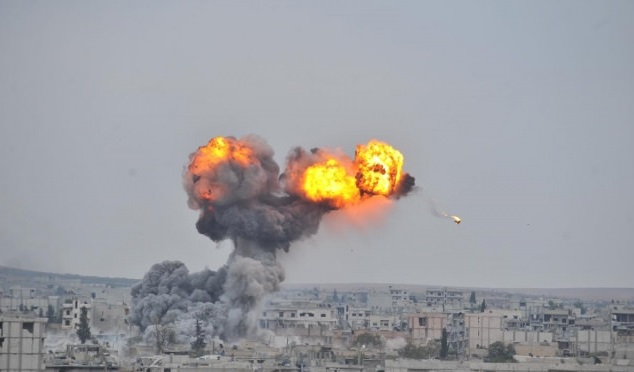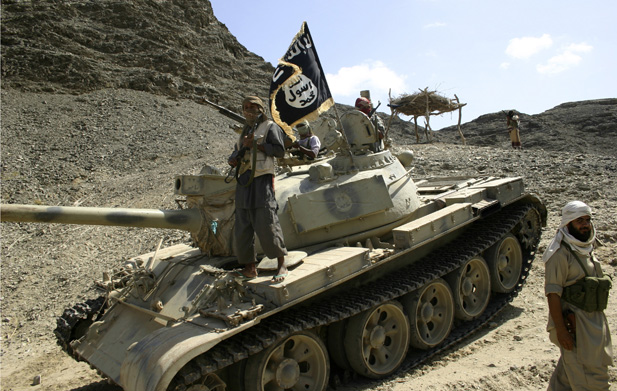International Strategy Against ISIS: Targeting Financial Assets
In early 2016, the US-led international coalition to defeat ISIS launched a new strategy designed to target ISIS’s financial assets. Recent airstrikes conducted by the coalition have destroyed four bank facilities in Mosul Iraq, including the Central Bank, al-Rasheed Bank, al-Aqari Bank and Abu Tammam Bank in Iraq, as well as two ISIS financial storage centers and two ISIS financial distribution centers. The air strikes have hit several key targets including oil trucks, oil refineries and oil fields, ultimately damaging or destroying more than 1,170 oil infrastructure targets under ISIS control. Further, the US believes that airstrikes in Iraq and Syria have destroyed more than $500 million in cash that ISIS relies on to pay its fighters and fund its terror and military operations. Since October 2015, the coalition says it has destroyed at least ten “cash collection points” estimated to contain hundreds of millions of dollars. Though, according to the Wall Street Journal, the group operates over 1,600 “cash exchange houses” in Iraq alone. Coalition officials have stated that they plan to strike more financial targets in the coming months in order to disrupt ISIS’s ability to function as a state.
The strategy already appears to be significantly impacting the Islamic State’s financial stability. An internal document retrieved and translated by Aymenn Jawad al-Tamimi, a researcher with the Middle East Forum, indicates that the group has slashed fighter salaries by 50%. The group has abandoned its free perks, and lower ranking fighters in Fallujah, Iraq are reportedly receiving no wages at all. As Financial Action Task Force President Je-Yoon Shin noted, crippling ISIS’s budget damages its ability to recruit and retain fighters, particularly local fighters who fight for pay rather than for ideology or religious reasons. Indeed, since implementing the 50% pay cuts last month, there has been a rise in “for-pay” fighters defecting from ISIS to rival militant factions.
Faced with a sudden cash shortage, ISIS has begun relying on other sources of revenue. Islamic State militants in the northern Iraqi city of Mosul are manipulating the exchange rate between US dollars and Iraqi dinars to capitalize on local financial flows. Currency traders in Mosul have confirmed that ISIS is selling basic commodities produced in factories it controls to local distributors, and paying salaries to its fighters and employees in dinars. The group imposed currency rates last month that strengthen the dollar when exchanged for dinars, which results in profits of nearly 20%. Parallel trading at better rates is inhibited by the Islamic State’s threat to confiscate the money of anyone who breaks their rules.
ISIS has further responded to the financial crunch by releasing 40 Assyrian Christian captives in mid-February in exchange for “millions” in ransom fees. Rami Abdurrahman, director of the Syrian Observatory for Human Rights, said that businessmen and the Assyrian church have paid approximately $25-30 million in ransoms to secure the release of 230 Assyrian Christians kidnapped in Syria last year. ISIS is releasing other Yazidi and Assyrian Christian hostages for upwards of USD $500 a person.
Banks, Bombs, and International Law: Is The Coalition’s Strategy Legal?
As part of a British inquiry into Islamic State funding mechanisms, panel expert David Butler said that the US-led coalition’s targeting of wellheads and road tankers has been effective. He advised the British government that disrupting oil financing must be complemented by targeting the wider network of illicit financing mechanisms ISIS exploits. Another panel expert, Iraqi Energy Institute Executive Director Luay al-Khateeb, said that the declining profitability of oil for ISIS is a result of both coalition airstrikes and the group’s difficulties in managing and maintaining the oil fields under its control. Al-Khateeb acknowledged that Turkey and Kurdistan might purchase ISIS oil, and argued that strengthened border control in those jurisdictions would help target shadow economies.
While it may be effective, the coalition’s strategy is questionable under international law. According to a Pentagon press briefing, the rationale for the attacks on cash storage sites and oil refineries is that these targets are “economic assets providing fuel to ISIS operations and attacks.” In January, for instance, the US successfully struck and destroyed a cash distribution site where ISIS was allegedly storing millions of dollars. However, the building struck was located in a civilian area, prompting the question of whether money, cash, and financial targets are legitimate under international law. The US military announced recently that airstrikes against financial targets in Iraq and Syria had likely killed several civilians. During one of the strikes, US commanders acknowledged that they had been “willing to consider up to 50 civilian casualties” given the significance of the target. The US has further stated that it will assess all targets on a case-by-case basis, but will not rule out civilian casualties for important targets.
The question of whether a party to an armed conflict may attack “war-sustaining” financial target is highly disputed. The law of armed conflict does not currently assign a status either civilian or military to money. This is a critical issue given that under international humanitarian law parties may only target “military objectives” and not “civilian objects.” A recent report published by the US Naval War College notes that the coalition should consider exercising other options rather than continuing aerial strikes on targets in civilian areas. It notes that better border enforcement by states adjacent to Syria may be an effective solution to limiting ISIS’s ability to capitalize on stolen oil refineries and looted cash. As the strikes increase in scope and volume, the question of international law is certain to be a critical and contentious issue shaping the future of the coalition’s fight against ISIS.




